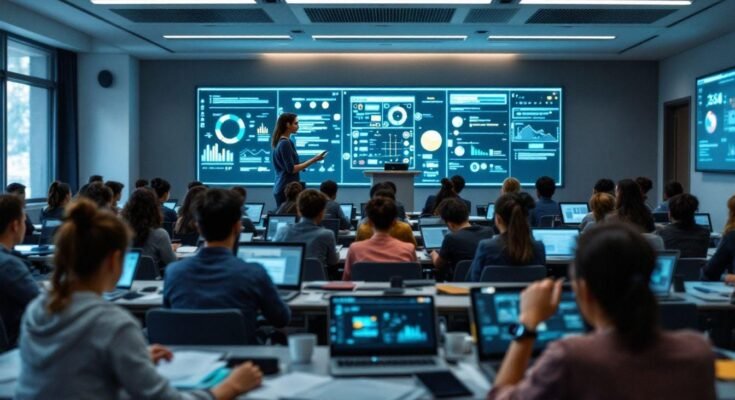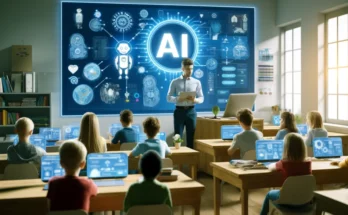Education has always been a cornerstone of human progress. Over centuries, we’ve evolved from chalkboards and textbooks to digital classrooms and online courses. But the biggest game-changer on the horizon is Artificial Intelligence (AI). As we look ahead to 2025, AI is set to revolutionize education in ways we can barely imagine. From personalized learning to smart tutors, AI promises a future where education is more accessible, engaging, and effective than ever before. Let’s dive deep into what AI in education looks like in 2025 and why it matters for students, teachers, and society. 🌍✨
What Is AI in Education? 🤔
Artificial Intelligence refers to machines or software that can simulate human intelligence — learning, reasoning, problem-solving, and adapting. In education, AI means integrating these smart technologies into teaching and learning processes.
By 2025, AI will no longer be a futuristic concept but a daily reality in classrooms, homes, and online platforms. It will help customize learning experiences, automate administrative tasks, and provide insights to improve educational outcomes.
The Rise of Personalized Learning 🎯✨
One of the most exciting impacts of AI in education is personalized learning — tailoring the educational experience to each student’s unique needs, pace, and interests.
How AI Personalizes Learning:
- Adaptive Learning Platforms: AI algorithms analyze a student’s strengths, weaknesses, and learning style. Based on this, the platform adjusts difficulty levels, suggests resources, and offers real-time feedback.
- Smart Content: Instead of one-size-fits-all textbooks, students get dynamic content — videos, quizzes, simulations — customized to how they learn best.
- Learning Pace: Some students grasp concepts quickly; others need more time. AI respects these differences and ensures no one is left behind or bored.
Imagine Sarah, a 10th grader struggling with algebra. An AI tutor identifies the exact concepts she finds tricky and provides targeted exercises with instant hints and encouragement. This kind of personalized help was unimaginable a few years ago but will be routine by 2025. 👩🎓🧮
AI Tutors and Teaching Assistants 🤖👩🏫
AI-powered virtual tutors and assistants will become commonplace, especially in large classrooms or remote learning environments.
What They Do:
- 24/7 Availability: AI tutors never sleep. They are always ready to help students with questions or practice problems.
- Instant Feedback: When a student submits an assignment, AI instantly grades it, highlights errors, and suggests improvements.
- Supplement Human Teachers: While AI can’t replace the empathy and creativity of a human teacher, it can handle routine tasks, allowing teachers to focus on personalized guidance and mentorship.
Take the example of a university professor handling hundreds of students — AI can grade multiple-choice questions in seconds, freeing up time for the professor to engage in in-depth discussions and projects. This blend of AI and human teaching will define education in 2025. 🎓💡
Breaking Barriers: Accessibility and Inclusion ♿🌐
Education should be for everyone, regardless of background or ability. AI has the potential to make this ideal a reality.
How AI Supports Inclusion:
- Language Translation: AI can translate lectures, textbooks, and exams in real-time, helping non-native speakers learn without barriers.
- Assistive Technologies: For students with disabilities, AI-driven tools like speech-to-text, text-to-speech, and smart prosthetics enhance learning and participation.
- Customized Learning Plans: AI designs plans that accommodate different learning needs, ensuring every student has a fair chance to succeed.
For example, a visually impaired student could use AI-powered screen readers and interactive audio lessons, leveling the educational playing field. By 2025, AI will make education truly universal. 🌍💙
Smart Classrooms and AI-Driven Analytics 🏫📊
Classrooms in 2025 won’t just have smartboards — they will be smart in every sense.
Features of AI-Powered Classrooms:
- Real-Time Monitoring: AI sensors track student engagement, attention, and even emotions to help teachers adjust lessons dynamically.
- Performance Analytics: AI analyzes grades, attendance, and participation to identify at-risk students and suggest interventions early.
- Curriculum Optimization: AI helps schools refine curricula based on what works best for student success.
Imagine a classroom where the AI notices that half the students are struggling with a topic and suggests the teacher spend extra time or provide additional resources. Such data-driven insights will boost educational quality everywhere. 📈📚
The Role of AI in Higher Education and Research 🎓🔬
Universities and research institutions are already harnessing AI, but by 2025, the role of AI will be even more profound.
AI in Universities:
- Admissions and Counseling: AI helps identify candidates who fit best with university programs and offers tailored career advice.
- Research Assistance: AI accelerates literature reviews, data analysis, and even hypothesis generation for researchers.
- Lifelong Learning: AI curates continuous education plans for alumni, helping professionals keep skills up to date.
Imagine a PhD student using AI tools to sift through thousands of research papers in minutes, spotting patterns humans might miss. This will speed up scientific discoveries and innovations. 🔍📑
Challenges and Ethical Considerations ⚖️🚧
While AI offers incredible opportunities, it also raises important challenges and ethical questions we must address carefully.
Key Concerns:
- Privacy: AI collects vast amounts of student data. Protecting this data from misuse is critical.
- Bias: AI systems can inherit biases from their training data, leading to unfair outcomes.
- Teacher Jobs: There’s worry about AI replacing human teachers, but experts believe AI will augment rather than replace educators.
- Digital Divide: Unequal access to technology can widen educational disparities if not managed well.
Education leaders, policymakers, and technologists must collaborate to ensure AI in education is fair, transparent, and accessible to all. 🤝🔐
How to Prepare for AI in Education: Tips for Students, Teachers, and Parents 🧑🎓👩🏫👨👩👧
As AI reshapes education, everyone involved should be proactive in adapting to these changes.
For Students:
- Embrace Lifelong Learning: AI tools can help you learn anytime, anywhere. Be curious and open to new technologies.
- Develop Critical Thinking: AI can provide answers, but developing the ability to question, analyze, and create is uniquely human.
For Teachers:
- Learn to Use AI Tools: Familiarize yourself with AI-powered platforms and leverage them to improve teaching.
- Focus on Empathy and Mentorship: Your human touch matters more than ever in guiding students emotionally and socially.
For Parents:
- Support Digital Literacy: Encourage your children to explore AI-based learning responsibly.
- Stay Informed: Understand how AI is used in your child’s education and advocate for ethical practices.
The Future Outlook: AI and Education Beyond 2025 🔮🚀
The integration of AI in education is just beginning. Beyond 2025, we can expect:
- Immersive Learning: AI combined with Virtual Reality (VR) and Augmented Reality (AR) will create fully immersive educational experiences.
- Global Classrooms: Students worldwide will collaborate on projects in real-time, guided by AI facilitators.
- Emotional AI: Systems will understand and respond to student emotions, improving motivation and mental health support.
The future of education is bright and deeply intertwined with AI innovations. We are moving toward a world where learning is personalized, accessible, and lifelong — a world where everyone can unlock their full potential. 🌟📘
Conclusion: AI Is the Education Partner We Need Today and Tomorrow 🤖❤️
Artificial Intelligence is not here to replace teachers or traditional education — it is here to enhance and empower them. By 2025, AI will be an indispensable partner in making education smarter, fairer, and more engaging. Whether you are a student eager to learn, a teacher passionate about inspiring, or a parent invested in your child’s future, AI’s role in education promises incredible benefits.
So, get ready to embrace this technological revolution and explore the limitless possibilities AI offers to shape the future of learning! 🚀🎓




